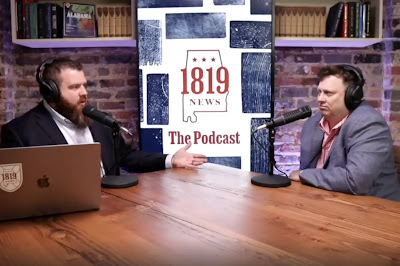 |
| Bryan Dawson (left) and Jeff Poor on an 1819 podcast. |
Police reports from Colorado indicate Kenneth Bryan Dawson engaged in horrific acts of violence before winding up in Alabama and becoming the head of 1819 News, a conservative news site that published a series of articles leading to the suicide of small-town Alabama mayor Fred "Bubba" Copeland. That's from a post today at donaldwatkins.com.
Word of Dawson's criminal record has been pretty well known for some time. But Watkins, a longtime Alabama attorney who has become a leading voice in online investigative journalism, takes a deep dive into the police investigation that produced first-degree attempted murder charges against Dawson, providing hair-raising insights into Dawson's conduct before he became a news executive in Alabama.
Speaking of which, how did Dawson, with his penchant for over-the-top violence and no apparent background in journalism, become a news executive at a site with ties to the Alabama Policy Institute (API), a right-wing think tank that grew from the same soil that produced Gary Palmer (R-AL), who briefly was in the running for speaker of the U.S. House of Representatives before the job went to Mike Johnson of Louisiana. Palmer and his allies reportedly have taken steps to keep their connections to Bryan Dawson on the "down low." It is going to be difficult, however to hide from the graphic descriptions of Dawson's violent past that Watkins unearthed in today's exclusive investigative report.
Watkins' report, after all, shows Dawson is capable of attempted murder, and one might think that issue would be of concern to Gary Palmer & Co., rather than being treated as something to sweep out of sight. Under the headline "An Inside Look into Kenneth Bryan Dawson’s First Degree Attempted Murder Investigation," Watkins writes:
Today, he is the co-founder, president, CEO, and publisher of Birmingham, Alabama-based 1819 News. His real name is Kenneth Bryan Dawson.
Dawson is the man who “outed” former Smiths Stations, Alabama Mayor Fred “Bubba” Copeland on November 1, 2023, for engaging in crossing-dressing activities in his home and writing works of erotic fiction. Three days after he was "outed," Bubba Copeland killed himself with a gun.
In April 2007, Kenneth Bryan Dawson was a hardcore drug trafficker and serial motor vehicle thief in Colorado Springs, Colorado, who tortured a member of his motor-vehicle theft ring with a taser and beat him with a padlock attached to a heavy chain – all because Dawson thought this violent crime victim was a “snitch.”
Justin Joslin, Dawson’s attempted-murder victim, said Dawson tased him 15 to 20 times. Joslin had burn marks on his legs and arms from the tasing. Joslin also sustained blunt force trauma to his forehead caused by Dawson hitting him with the padlock.
The treating physicians at the hospital told police Joslin was “lucky to be alive.”
Dawson sounds like a swell guy, doesn't he? Just the type you would want to hire to run a news operation -- assuming you could keep him from MAKING news by trying to murder people who displease him. Writes Watkins:
The Colorado Springs, Colorado Police Department investigative report on Dawson’s attempted murder is detailed and damning. [The police file may be viewed by clicking the link here.]
Dawson accused Joslin of being a “snitch” for the police.
Dawson threatened Joslin that if he (Joslin) went to the police about this incident, “I will shoot you in the face, I will fucking kill you.”
Gee, that's lovely. And this is a guy who now apparently is viewed as somewhat of a pastor, known to give fiery sermons at Alabama churches. And this question comes to mind: What if a reporter made a mistake in the 1819 newsroom? Would Dawson threaten to f----g kill him or her? I've had some tough editors in my 40-plus years in journalism, but I've never had one that sounded like a threat to public safety. Should Dawson even be allowed to work around other human beings? Writes Watkins:
After Dawson was arrested, police found methamphetamine, glass pipes for smoking it, cash, the taser Dawson used on Joslin, and an illegal sawed-off shotgun. They also retrieved the computer and camera that Dawson and his accomplice, Alexander Poe, stole from Joslin’s home.
Poe was also involved in Dawson’s drug-trafficking ring. Police located Poe inside a “stash house” used by Dawson.
In 2021, the Alabama Policy Institute launched Dawson’s 1819 News operations in Alabama with a $1,077,500 contribution to 1819 Media LLC.
Today, Kenneth Bryan Dawson, via his 1819 News multimedia platforms, effectively serves as the public face and media voice of the Alabama Policy Institute.
Gee, what does Dawson keep in his desk at the 1819 newsroom? Maybe someone needs to check. Does Dawson have a "stash house" in Alabama? The questions never end with this guy.






